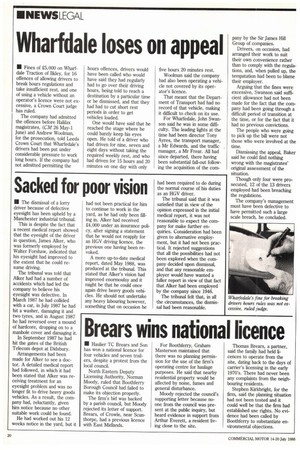Sacked for poor vision
Page 18

If you've noticed an error in this article please click here to report it so we can fix it.
• The dismissal of a lorry driver because of defective eyesight has been upheld by a Manchester industrial tribunal.
This is despite the fact that a recent medical report showed that the eyesight of the driver in question, James Alker, who was formerly employed by Walter Forshaw, indicated that his eyesight had improved to the extent that he could resume driving.
The tribunal was told that Alker had had a number of accidents which had led the company to believe his eyesight was defective. In March 1987 he had collided with a car, in July 1987 he had hit a washer, damaging it and two tyres, and in August 1987 he had reversed over a mound of hardcore, dropping on to a manhole cover and damaging it.
In September 1987 he had hit the gates of the British Telecom depot at Didsbury.
Arrangements had been made for Alker to see a doctor. A detailed medical report had followed, in which it had been stated that Alker was receiving treatment for an eyesight problem and was no longer fit to drive heavy goods vehicles. As a result, the company had, reluctantly, given him notice because no other suitable work could be found.
He had worked out his 12 weeks notice in the yard, but it had not been practical for him to continue to work in the yard, as he had only been filling in. Alker had received 24,000 under an insurance policy, after signing a statement that he would not reapply for an HGV driving licence, the previous one having been revoked.
A more up-to-date medical report, dated May 1988, was produced at the tribunal. This stated that Alker's vision had improved enormoulsy and it might be that he could once again drive heavy goods vehicles. He should not undertake any heavy labouring however, something that on occasion he had been required to do during the normal course of his duties as an HGV driver.
The tribunal said that it was satisfied that hi view of the opinion expressed in the initial medical report, it was not reasonable to expect the company for make further enquiries. Consideration had been given to alternative employment, but it had not been practical. It rejected suggestions that all the possibilities had not been explored when the company decided upon dismissal, and that any reasonable employer would have wanted a fuller report in view of that fact that Miter had been employed by the company since 1946.
The tribunal felt that, in all the circumstances, the dismissal had been reasonable.














































